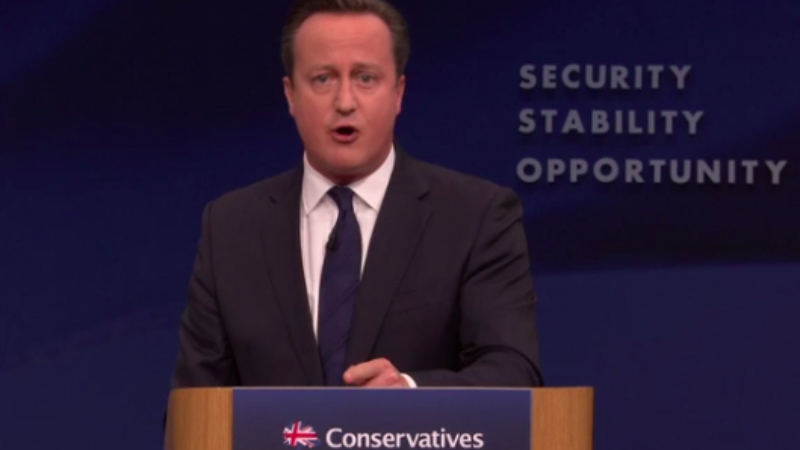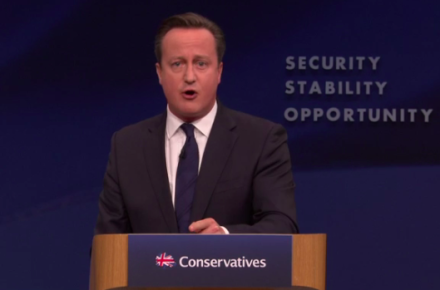

I’ve never accused David Cameron of lacking an immigration strategy. He clearly has one – to govern through gimmicks. And there are so many to choose from.
This week Cameron announced £20 million of ‘new’ funding that will fund ‘English language tuition’ to help ‘combat social isolation for some Muslim women’. Did you notice his use of ‘combat’ there, too? This is no slip of the pen. The Prime Minister thinks the road to tackling extremism runs through people sitting more English lessons.
But the Prime Minister is playing the public for fools. His governments have cut funding for English instruction through deep hits in 2011 and 2015 estimated at about £45 million. The ‘new’ £20 million doesn’t make up half his cuts.
Funding used to support any individual that needed it. But now the new money will only go to some – and not all. While Cameron says the target of this funding programme will be ‘Muslim women’ it’s not focused that narrowly, but will be available to help women requiring support more generally. No doubt Muslim women may benefit from this help, but it is curious that he singles them out without reference to the women of other faiths who may benefit from this funding support, too.
Let’s return to Cameron’s mention of ‘combat’. He has set his sights on improving English language skills in order to ‘combat’ social ills like ‘gender segregation and discrimination’. Cameron said in a statement that better English skills will help foster ‘women’s empowerment’ that will ‘break down barriers’ and guard against ‘radicalisation and extremism’.
Andy Burnham, the Shadow Home Secretary, got it right in his response when he said that Cameron’s plan was overly simplistic – tackling extremism will take more than better access to English lessons. This isn’t to deny better English helps drive integration. It is easier for anyone to become involved in their local community if they can easily communicate in English. But knowing how to order at a restaurant or ask for instructions when driving are no guarantee that people can feel a part of Britain – especially when we’re constantly reminded about the problems, not the future prospects, we bring.
Let us turn to the fine print. Cameron’s announcement claims it is ‘new’ and will tackle barriers to participation by women in English language learning by funding classes in ‘homes, schools and community facilities’. Here is some news for the government: many English for Speakers of Other Languages (ESOL) already do this. It’s not new, only underfunded and undervalued by 10 Downing Street.
The government says that those applying to settle permanently in the UK must now be able to speak intermediate English and pass the UK’s citizenship test – a test I’ve previously likened to ‘a bad pub quiz’ in the only comprehensive report about it in 2013. Here is some more news for the government: it has long been part of Britain’s common law that citizens possess a knowledge of life in the UK and English. This was incorporated into statute as far back as the British Nationality and Status of Aliens Act 1914 over a century ago. Formal tests for English language and knowledge about the UK were launched by Tony Blair’s Labour government. And, yes, the test had questions about Britain’s history. I should know – I had to take it! So nothing new here either.
Finally, the government says that anyone on a spouse visa will be tested for English language skills after they have lived for two and a half years in the UK. Showing no progress won’t mean deportation, but it might lead to a future visa extension or application for permanent residency being rejected. Sounds tough, doesn’t it?
That’s only because the government is moving towards Labour’s policy a decade ago. Spousal visas used to require a residency of two years. After this period, a spouse could apply for permanent residency – and would be required to confirm some command of English. The coalition government changed the rules. It made the residency period five years. That meant instead of many spouses getting checked in two years, this was delayed for much longer. So bringing up checks to 2.5 years is almost as soon as it was under Labour.
It’s easy to think the government has simply lost its way on immigration. It has. The problem with making policy only by reacting to the right wing media is that you’ll never win. There is no leadership. Every announcement is a gimmick that anybody with a smattering of knowledge about immigration rules can see for the charade that it is. And the only reason they do it is because they can get away with it – few people need ever become familiar with 2,000 pages of primary and secondary legislation on immigration. If the public don’t know, maybe they might even believe the government’s fairy tale. All the more reason why migrants need to call this out for what it is.
I don’t enjoy exposing the Prime Minister’s immigration policies as one gimmick after another with so much hot air it could send Sir Richard Branson around the world in record speed. It’s because when we get a constant stream of rhetoric without substance it does no one any favours. The public grow more sceptical about what politicians can and should deliver – and migrants are left to pay the price personally (and financially).
If the Prime Minister is generally worried about building ‘a strong society’, he should reflect more on how his policies make this noble ambition fall further out of reach.
Thom Brooks is Professor of Law and Government at Durham University, Visiting Fellow at Yale Law School and Communications Lead for Phil Wilson MP. His new book, Becoming British: UK Citizenship Examined, is published by Biteback next month.




More from LabourList
Letters to the Editor – week ending 22 February 2026
‘The coastal towns where young people have been left behind by Whitehall’
‘How Labour is modernising transport in Wales with fairness at its heart’